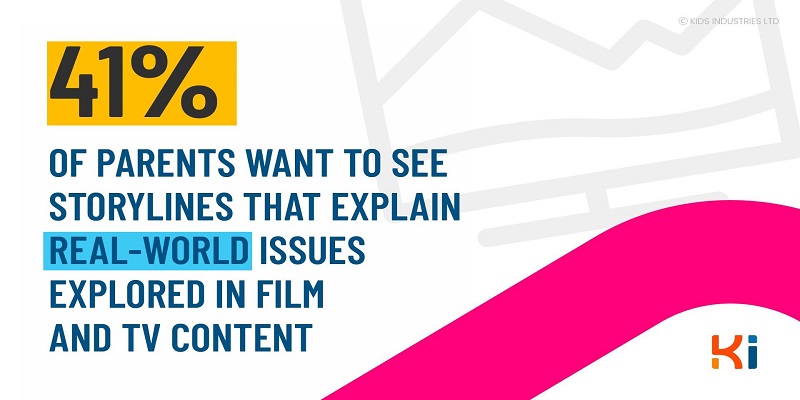Family-focused marketing agency Kids Industries launched a new report today exploring the concept of diversity and inclusion amongst children and their parents – and what this looks like in the media that they engage with. The survey, carried out across 2,001 parents of children (aged five to 15) in the UK and USA – paints a picture of rising concerns from parents over screen time, yet also acknowledges how they appreciate the benefits of digital play. There is however a desire from parents for more inclusive media attributes.
“Play underpins everything that our children will become – it is as Maria Montessori said: ‘The work of the child.’ Our research indicates that 67 per cent of parents feel their children’s schools are good or excellent when it comes to their diversity and inclusion policies and approaches which shows there is much more work to be done. We must listen to children and parent voices and ensure their needs and wants are reflected in the media that they consume. Nothing is more important than protecting and promoting a child’s right to play and making those play experiences the very best that they can be is essential and something that the industry needs to give serious consideration,” said Kids Industries and Children’s Commissioner for Products of Change CEO and co-founder Gary Pope.
The research highlights that parents want more inclusive media consumption for their children and that many of them find subtitles or closed captions (CC) appealing.
Children’s media consumption (across TV and films) must be more inclusive:
What parents notice- Almost three quarters of all parents questioned said that their child enjoys watching and listening to stories about characters who look or are different to them (67 per cent in the UK, 79 per cent in the US) and 64 per cent said their child would like to see more characters who are like them in the media.
Key issue- 74 per cent of parents agree that their child learns about people who are different from them through the media they consume – yet alarmingly, 49 per cent say that this media features many negative stereotypes of different groups (42 per cent in the UK, rising to 56 per cent in the US).
Moving forwards- Just over half of all UK and US parents (53 per cent) would like to see more positive role models in the media. 41 per cent would also like to see more storylines that explain real-world issues to children – a similar figure as those who would like more ‘soft’ education content, for example, problem solving (43 per cent). Programmes that involve traditional education e.g., math skills appealed to 38 per cent of parents.
In terms of representation, 26 per cent of parents want to see equal gender representation (22 per cent in the UK and 30 per cent in the US) and in the UK 29 per cent expressed a desire for more ethnically diverse characters again, higher amongst US parents at 33 per cent.
Better disability representation was requested by 23 per cent of parents and 12 per cent would like to see increased LGBTQ+ representation.
Subtitles or closed captions (CC) appeal to both disabled and non-disabled children:
What parents notice: 74 per cent of US parents reported that their child watches content with subtitles or closed captions (CC) – with 24 per cent choosing to use them all or most of the time. This compares with 54 per cent in the UK using subtitles or CC and nine per cent using them all of the time. Half of US and UK parents (50 per cent) of parents said that their child needed subtitles/CC to enjoy media content.
Key issue: Just 64 per cent of all parents say that subtitles/CC for their child’s media are always accurate and high quality – rising to 70 per cent in the US. Furthermore, access is limited – just 46 per cent of UK parents said that all of the media their child loves has a subtitle/CC option, compared to 63 per cent of US parents.

